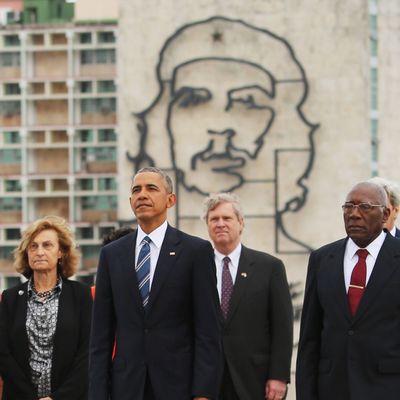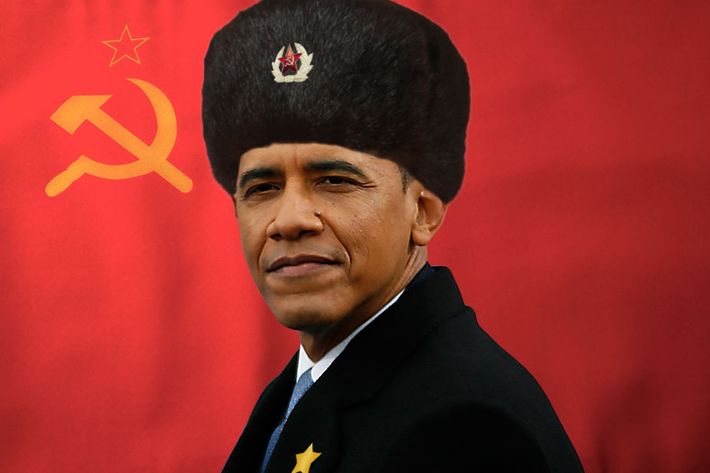
Yesterday, President Obama visited Cuba at a moment when his presidency is at an apogee, and international communism is mired in a long, terminal decline. Obama has revived the liberal project, implementing center-left reforms to end the Great Recession, reduce carbon emissions, regulate financial markets, and expand access to health insurance (health care notably having long been perhaps Cuba’s only conceivable advantage relative to the U.S.). Yet, in the United States, liberalism faces greater pressure from the left than at any time since the 1960s, when a domestic liberal presidency was destroyed by the Vietnam War.
While socialism remains highly unpopular among the public as a whole, Americans under the age of 30 — who have few or no memories of communism — respond to it favorably. The Bernie Sanders campaign has introduced once-verboten questions about the market system into Democratic Party politics — a challenge Hillary Clinton has beaten back by relying on the residual loyalties of her base rather than mounting a frontal ideological challenge. Meanwhile, Jacobin magazine has given long-marginalized Marxist ideas new force among progressive intellectuals. It seems impossible at the current moment to imagine Marxists exercising power at the national level. But it also seemed impossible to imagine New Deal–hating conservatives — then just a faction within a party — exercising national-scale power after their standard-bearer was routed in the 1964 elections. Yet, a mere 16 years later, their time had arrived. So, on the theory that it’s never too early to start planning the counterrevolution, it is worth reiterating that Marxism is terrible.
Sanders’s success does not reflect any Marxist tendency. It does, however, reflect a generalized hunger for radical solutions, discontent with the Obama administration’s pace of progress, and a generational weakening of the Democratic Party’s identification with liberalism over socialism. It has never been exactly clear what Sanders means when he calls himself “socialist.” Years ago, he supported the Socialist Workers Party, a Marxist group that favored the nationalization of industry. Today he endorses a “revolution” in metaphorical rather than literal terms, and holds up Denmark as the closest thing to a real-world model for his ideas. But, while “socialism” has meant different things throughout history, Denmark is not really a socialist economy. As Jonathan Cohn explained, it combines generous welfare benefits and high-quality public infrastructure with highly flexible labor markets — an amped-up version of what left-wing critics derisively call “neoliberalism.” While Denmark’s success suggests that a modern economy can afford to fund more generous social benefits, it does not reveal an alternative to the market system.
It is on politics, not economics, where the influence of Marxist ideas has been most keenly felt. Enough time has passed since the demise of the Soviet Union to allow Marxist models to thrive without answering for communist regimes. In his fascinating profile of Jacobin, Dylan Matthews notes, “The magazine is not going to defend Stalin’s collectivizations or Mao’s Great Leap Forward or really any other aspect of ‘actually existing communism.’” But the fact that every communist country in world history quickly turned into a repressive nightmare is kind of important.
Many Marxist theorists have long attempted to rescue their theory from its real-world adherents by attributing its failures to idiosyncratic personal flaws of the leaders who took power (Lenin, Stalin, Mao … ). But the same patterns have replicated themselves in enough governments under enough leaders to make it perfectly obvious that the flaw rests in the theory itself. Marxist governments trample on individual rights because Marxist theory does not care about individual rights. Marxism is a theory of class justice. The only political rights it respects are those exercised by members of the oppressed class, with different left-wing ideological strands defining those classes in economic, racial, or gender terms, or sometimes all at once. Unlike liberalism, which sees rights as a positive-sum good that can expand or contract for society as a whole, Marxists (and other left-wing critics of liberalism) think of political rights as a zero-sum conflict. Either they are exercised on behalf of oppression or against it. Any Marxist government immediately sets about snuffing out the political rights of parties or ideas deemed reactionary (a category that also inevitably expands to describe any challenge to the powers that be). Repression is woven into Marxism’s ideological fabric.

Political correctness borrows its illiberal model of political discourse from Marxism, and it has mostly played itself out on university campuses and other enclaves where the left is able to impose political hegemony. (This is why some liberals who don’t agree with political correctness, but also don’t want to criticize it, dismiss it as nothing more than harmless college prankery.) Just this week, Emory University’s president promised to use security cameras to track down and prosecute students who wrote “Trump” in chalk — chalking being a normally acceptable medium for sloganeering — after student activists pronounced the word a threat to their safety.
Of course, since students can easily access hurtful campaign news with more modern communication tools than chalk, the application of p.c. logic to the presidential campaign requires action beyond the walls of the ivory tower. Trump’s campaign has given the illiberal left the chance to import its methods to the broader stage of a presidential campaign. Left-wing groups have set out to prevent Trump from delivering public speeches. The tactic first appeared just over a week ago in Chicago, where several hundred University of Illinois at Chicago faculty members signed a letter asking the university to cancel Trump’s speech, and a demonstration planned to, in its words, “#SHUTITDOWN.” There is some dispute as to whether the demonstrators caused Trump to cancel his speech, or whether he used them as a pretext. What is indisputable is that a faction of the left has made shutting down Trump rallies its goal. A version of the tactic reappeared in Arizona, where activists blocked highway access to a Trump rally, though police managed to clear them. Sanders, to his credit, has decried such efforts, but influential left-wing intellectuals have defended the practice in essays with headlines like “How the people of Chicago silenced Donald Trump.”
The efforts to shut down Trump reflect the growing influence of Marxian politics, and these ideas merit study. A Jacobin column defends “impair[ing] the circulation of Trump’s hate-filled message.” What about free speech? Well:
Free speech, while an indispensable principle of democracy, is not an abstract value. It is carried out in the context of power disparities, and has real effects on peoples’ lives. We can defend freedom of speech — particularly from state crackdowns — while also resolutely opposing speech that scapegoats the most vulnerable and oppressed people in our society.
Free speech is for people on the wrong end of “power disparities” — which is to say, the oppressed and their allies, or, put more bluntly, the left. Free speech is not for a candidate who “scapegoats the most vulnerable and oppressed.” Importantly, this principle denies the right of free speech not only to Trump but also to the entire Republican Party (whose analysis of poverty, crime, terrorism, and so on constitutes scapegoating of the oppressed) but also large segments of the Democratic Party as well. It is highly unlikely that the illiberal left gets its hands on the machinery of the federal government within our lifetimes, but if it does, repression would be a foregone conclusion.
In the meantime, obviously, Trump poses a far more dire danger than his would-be censors. But it is important not to succumb to the panic that the far left is inculcating around Trump. Trump would threaten American democracy if elected, but all evidence suggests his election is highly unlikely. Trump is disliked by a massive, landslide majority. A majority actually fears him. There is no strategic reason to believe that preventing Trump’s election requires direct confrontation or anything other than normal campaigning. In fact, there is more reason to believe that confrontation helps Trump than to believe the opposite. A poll found the Chicago conflagration made Republican voters, on net, more rather than less likely to support Trump. A reporter I know on the trail met two voters who told him they switched from John Kasich to Trump in response to Trump canceling his speech. That reporter also conveyed the same impression described by Seth Stevenson: Trump’s barking ejections of protesters at his rallies are their emotional apex, the one point in the generally rambly and often boring soliloquies where Trump can demonstrate the atavistic qualities of command. It stands to reason that supplying evidence for Trump’s claim to be the victim of political correctness helps rather than hinders him.
But the efforts to shut down Trump are not the product of calculation — or, at least, not a calculation to prevent Trump’s election. The justifiable fear Trump engenders provides the far left, which has no immediate prospects of enacting its program democratically, with the thrilling opportunity to bring the struggle from the ballot box to the streets. “Sometimes a combative scrum — not the marketplace of ideas — is the face of democracy,” exults Jacobin. “Severe threats to equality often push people to act militantly, marshaling their own speech to ward off their authoritarian foes.” It even admits that blocking Trump by electing his major-party opponent is not the point, urging on “a fight for real democracy — not just trusting [the] candidate who supports the very neoliberal policies that helped birth Trump.” Matthews may credit Jacobin with “winning the war of ideas on the left,” but Jacobin’s notion of winning this war seems to be a bit more literal.
Nor do realistic advocates of social and economic equality have any reason to share or accept the left’s desperation. The popular, sitting liberal president has enacted the most important egalitarian social reforms in half a century, including higher taxes on the rich, lower taxes on the poor, and significant new income transfers to poor and working-class Americans through health-care reform and other measures. All of this has happened without the alliance with white supremacy that compromised the New Deal, or the disastrous war that accompanied the Great Society. The case for democratic, pluralistic, incremental, market-friendly governance rooted in empiricism — i.e., liberalism — has never been stronger than now. What an odd time to abandon a successful program for an ideology that has failed everywhere it has been tried.






























